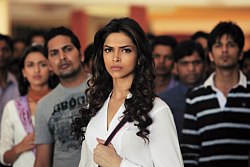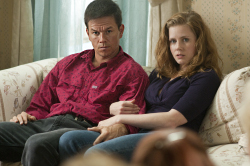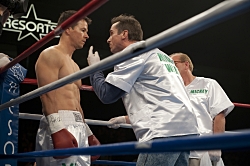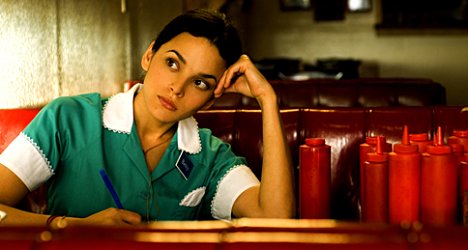Interview With Milt Bearden (CIA Consultant)
 Interview With Matt Damon (Edward Wilson)
Interview With Matt Damon (Edward Wilson)
 Interview With Robert De Niro (Bill Sullivan, Director, Producer)
Interview With Robert De Niro (Bill Sullivan, Director, Producer)
 Interview With Angelina Jolie (Clover Russell)
Interview With Angelina Jolie (Clover Russell)
 Interview With Eric Roth (Screenwriter)
Interview With Eric Roth (Screenwriter)
 Interview With John Turturro (Ray Brocco)
Interview With John Turturro (Ray Brocco)
Popular on LondonNet
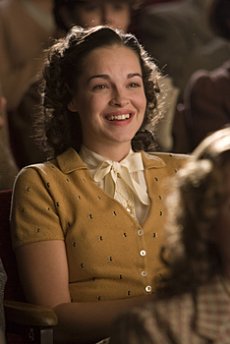 Eric Roth is one of the most interesting screenwriters working in Hollywood today. He won an Academy Award® for Forrest Gump and has written two films directed by Michael Mann — The Insider, starring Russell Crowe and Al Pacino, and Ali, starring Will Smith. He also co-wrote the Academy Award®-nominated screenplay for Steven Spielberg’s Munich and adapted The Horse Whisperer for director Robert Redford. Now, after 12 long years, one of his most personal projects, The Good Shepherd, has finally come to the screen…
Eric Roth is one of the most interesting screenwriters working in Hollywood today. He won an Academy Award® for Forrest Gump and has written two films directed by Michael Mann — The Insider, starring Russell Crowe and Al Pacino, and Ali, starring Will Smith. He also co-wrote the Academy Award®-nominated screenplay for Steven Spielberg’s Munich and adapted The Horse Whisperer for director Robert Redford. Now, after 12 long years, one of his most personal projects, The Good Shepherd, has finally come to the screen…
This has been long-term project, with some big names attached as director over the years…
Well, when I finished Forrest Gump I had a little cache and they asked me what I’d like to do, rather than telling me what to do. I had been interested in the idea of doing something about the CIA. I’d always been interested in how that kind of work can affect you emotionally, in your life and family. So I checked with my agent to see who might be interested in directing something like that, and we found out that Francis Ford Coppola was interested. He was interested in adapting this very well written book about the CIA. So I asked if I could go and see him; we’d met a couple of times. I told him the idea I had and he liked it very much.
So what happened after you spoke to Coppola?
He and his producing partner took it to Columbia Pictures and Francis told me to go and write it. I’d check in with Francis every once in a while, and then when I finished he loved the script. But then Francis had some tragic personal problems in his life, and in fact he never directed a movie again for along, long time. We then had Wayne Wang come on as director. He wanted to make the movie but then the management at the studio switched and they changed their mind about him.
And what time period was this?
Well it was 12 years ago that I stared, so let’s say this was two years after, so 10 years ago. Then Phil Kauffman was a director that they liked, and we worked together for a while. Then the management changed again, and he wasn’t the director for them so eventually John Frankenheimer wanted to do it. Frankenheimer had made a movie with Robert De Niro, Ronin. Bob and John were friendly and John asked Bob to play a part in my screenplay, The Good Shepherd.
Was it the same part De Niro ended up playing in the movie?
I’m not sure it was, I think it was another part. But in any case, John wanted Bob in the movie, but when we were preparing to make the movie, John passed away.
When did De Niro step in to direct?
A short time later, Bob came to me and said he’d possibly be interested in directing my script, because he himself had been developing a project similar in the sense that it was about the CIA, although in a different time period than I had written about. But he loved my script and asked how we could work it out, so we talked about it, should we do his idea or mine, and then one of us said that if Bob directs The Good Shepherd, I’ll write his script, as a second part, for him, which would pick up after the Bay of Pigs. The Good Shepherd goes from the birth of the CIA up until that point. So that was eight years ago, and there was this long gestation period. We’d work on the script when we saw each other, and talk, and at the same time Bob was trying hard to cart the costs around – these things aren’t cheap and it’s a serious subject matter, but eventually, because of Bob’s persistence it came off. I think some people had some problems with a film about the CIA, but the basic material always stayed the same.
The events of 9/11, and what followed, triggered more interest in the CIA. Do you think this film could have got made pre-9/11?
Who knows, it’s hard to gauge that. I don’t want to say that 9/11 was a good thing. The material stayed the same, in a sense, but I think people’s awareness of the CIA grew, with 9/11 and the Iraq War, and the agency’s involvement in that, with the WMD. But I think the core of the script, and which I hope comes through in the movie, is this family story, what it means to be an individual man in the CIA, trying to hold a family together, while living all these secret lives. So I think it was always a viable piece, but it was hard and not all that obvious – it wasn’t always easy for people to see why we should make this movie. But Bob was diligent.
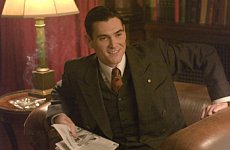 Is it true that Leonardo DiCaprio was going to play the lead?
Is it true that Leonardo DiCaprio was going to play the lead?
Yeah Bob brought Leonardo on board, although scheduling eventually screwed that up, so then Matt came in right away. They’re both wonderful actors.
When writing, were you motivated more by the human story than the specific details of how the CIA was formed?
Not exactly. I’m thematically most interested in a man in power in this organization and how that might affect him. But the gods are in the details, whatever you write, and historically I was interested in the fact that it started with those 50 or so people and now there are 30,000 people, which is pretty amazing. We always assume the CIA has been around forever, but it has only been here since 1947, which is long time in one respect but a short time in another, and it has so much power. And with so many people committed to this organization it’s amazing to think that it grew out of this little germ.
You must have met many CIA operatives, are any of them able to maintain happy marriages?
Well I think they maintain happy personal relationships, for sure, but I think that if you’re going into this, it’s like the Godfather in a sense, that wives could not know what their husbands did. They knew they were in the CIA but they didn’t know what they did there, and I think that’s true of many military families. People now don’t know where their sons are in Iraq, and if you’re whole life is that way, for years and years, it must be strange. You may come to terms with it, but there’s an estrangement, when you can’t talk about what you do, and unload about a bad day in the office. If you can’t talk about specifics, that seems hard to me.
How did you manage to secure access to the CIA in the early days of the project?
We were lucky. When I initially did it, it was through Francis. I spent a lot of time talking to a Pulitzer Prize winning journalist, and a few other people. But then Bob came along and he was friendly with Milt Bearden, who’s done this for 30 years, and he’s the best. He was at a high level in the CIA and he kept us on course with what was accurate, and he put us in our places a couple of times. I always used him as a sounding board, about what people did but also about how they might feel about certain things. I hope it’s as realistic an espionage/spy movie that’s ever been made. I think it is. Milt was very smart and went to Yale. Plus he introduced us to a whole bunch of people over the years, and we had a big roundtable in Washington with 16 agents, so we got good coverage that way. We also talked to heads of other agents — the British and Israeli Secret Services. They might not agree with some of the emotional qualities of some of the things we portray but we think it’s accurate in terms of what they would have done.
So you didn’t have to compromise any of the history to carry the human narrative?
I don’t think we ever did, and I’m not sure I would in a sense. Usually if it seems as though I’m forced to choose between drama and historical accuracy, I would look to do the historical accuracy in a dramatic way, so I don’t think you have to choose. I think I did that with Ali, The Insider and Munich, so I know that the truth is always more important.
 One of the most memorable scenes in the movie is the interrogation. During that we’re told that Russia is less of a threat than the CIA pretends. Was there truth in that?
One of the most memorable scenes in the movie is the interrogation. During that we’re told that Russia is less of a threat than the CIA pretends. Was there truth in that?
I don’t know if it was quite a truth, maybe more a metaphor. Russia was definitely still a threat — they had nuclear weapons. This had more to do with the fact that Russia was broke, although those words are taken from literal sources, and it was well known that they were in a poor economic state, so Russia was more like a wounded bear. And a wounded bear is still dangerous, right? But there was this whole philosophical thing about America being a big military industrial complex that needed an enemy, and you can agree or disagree, either way, I’m not advocating either side. It was originally said by Eisenhower. I’m not sure it’s 100 per cent accurate but it’s absolutely true that part of our government was controlled by the arms industry, in the way that maybe the pharmaceutical or oil industries do now. They became an accepted wing of the government and they became one of the influences I was interested in. What the influences are that the CIA has to deal with.
Syriana dealt with similar kinds of influence on government. Did you enjoy that take on the CIA and the Middle East?
I did enjoy it, but I don’t feel the same comparison. I’m very close to the director, Stephen Gaghan, but it is very different. This is more of a personal story, in a specific sense, about Matt Damon’s character, and the pervasive nature of truth and secrecy and trust.
Stephen Gaghan said that the most important thing in his writing was transition — moving from one scene to the other — is that something you felt with this movie, being a non-linear story?
In relation to this movie, I would say that probably is true with this movie. The transitions were hard. But also I think it’s traumatic trying to keep the storytelling going. I’m a great believer in simplicity — not that the movie’s simple — more that every movie always has three acts, maybe four, even if it’s a Charlie Kaufman movie. There’s the beginning where you present the problem, the second act where you complicate the problem and the third act where you solve the problem or don’t. It’s all traditional Shakespeare and it’s true of every story no matter how post-modern you get.
Was it hard to maintain the narrative with so much intrigue and complexity?
Yeah, I guess what’s tough for me is when I run into trouble with the story wandering away from me. And this was very complicated in The Good Shepherd, because so many stories weave together. So trying to keep these together knowing way down the line I’d have to pay off certain things, or not; that’s part of the technique. And, while it might make the audience uncomfortable, there are some things you’ll never know, because that’s what the CIA is like.
Are you a trusting man, Eric, or are you like your protagonist with a suspicious mind?
That’s a great question, very interesting. I think I’m somewhere in-between. I’m not entirely sure I take people quite on face value. I’m a little more defensive I guess. I’m trusting in people I love. A great question though — I love that, there are so many shades of grey in that. I think being part of the movie business you have to be cautious. Maybe it’s more in business than in life, but if someone calls me and I haven’t heard from them in a long time, I’m waiting for them to reveal what they’re really calling about.
Have you changed working in Hollywood for so long?
I’m not sure. I might have thick skin – as a writer you have to get used to rejection, same as being an actor. I love movies so much that I’m a great believer in the whole thing, so I’m a bit of a sap in that sense, I want to believe. It’s probably my Achilles Heel. But you have to have passion for your work.
Is it harder to draft a complex original screenplay like this and The Insider than it is say, an adaptation, like The Horse Whisperer?
They all have a degree of difficulty and throw up problems that you’re not expecting. The Horse Whisperer is kind of interesting because there was a big battle between Robert Redford and me. I wanted him to play his age, but he didn’t really want to. So that sense of him getting older becomes a whole psychodrama and subplot that’s going on and I thought thematically that was interesting. This was way more complex, but something like that has its own problems in that should you have them make love at the end, and those kind of things. It’s also a best-seller, and people have their own notion of what the characters should be and should look like, so it’s almost better sometimes if no one liked the book.


